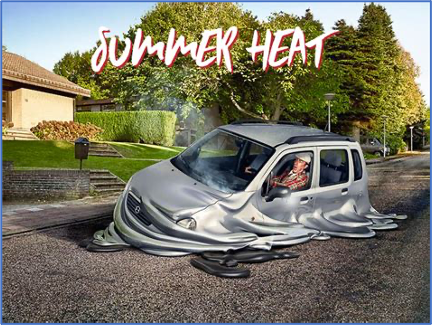Don’t Let Summer Heat Up Your Driving! Important Summer Driving Tips!
The summer season is great for road trips and, unfortunately, car trouble. High heat temperatures can be disastrous for your car’s most important systems. Summer’s “Hot Time” can be a “Hot Mess” for your car.
Take a look at the below tips and be prepared for summer driving!
Make Sure Your AC Is “All Cold.”
Summer heat can wreak havoc on your cars’ cooling system. Your AC system needs to blow hard and cold at the push of the button. If it doesn’t, you should have it checked by an honest, reputable service and repair center. At 90 plus degrees outside, you’ll love the cool inside of your car when your air conditioning system is working the way it should on those long hot summer adventures. Be cool and have fun!
Don’t Let Your Tire Air Pressure Raise Your Blood Pressure!
Did you know that your tires can actually lose air pressure over time and different temperature conditions? Yes, the air molecules can actually leak through the rubber membranes, very, very slowly. Especially if your car sits without driving it over long periods of time. So, before going on long driving trips this summer, make sure you inspect your tire pressure. The pressure can be under or over inflated. Having a flat tire on a hot day is no fun! That will raise anyone’s blood pressure!
Make Sure Your Engine Fluids Are Topped Off!
It’s always a good practice to check your engine fluids. The fluids tend to thin out or even evaporate in higher temperatures. Transmission fluid, power steering fluid, coolant and windshield wiper fluids should all be checked. Especially your coolant fluid. This keeps your car from running hot and overheating which could cause sever damage to your engine. But be careful, the coolant fluid can explode out of the coolant reservoir and cause extreme burns if the car hasn’t cooled off over a period of time. It’s better to have a certified repair shop check the coolant and other fluids to avoid any mishaps.
Battery Check-Up. A Healthy Battery Is A Better Battery!
Check your battery before your trip. Your battery is the electrical power that powers your vehicle. It not only starts your car, it maintains various components in your car and keeps it up to date, like your clock, central locking system and the computer.
Most batteries are sealed and considered no or low maintenance. But they should be checked for proper voltage by a qualified auto technician if it cannot start your car. Also check for any corrosion on the cables, posts and wirers. And don’t forget to check the date when the battery was installed.
Very important! If the battery is bubbling, leaking or smoking stay away! It could possibly explode and cause major injuries!
Change Your Oil & Filter. A Must!
Getting your oil and filter changed is one of the most important maintenance items you can do. It is the life blood of your car. It increases the longevity of your vehicle, lubricates your engine and removes contaminants while keeping it safe from the wear and tear of driving.
A good rule of thumb is to change your oil every 3,000 to 5,000 miles regardless if you’re using regular grade oil or full synthetic oil. Remember your oil and filter is the life blood of your vehicle.
Give Your Brakes A Break. Test Your Brakes Today!
Summer is an excellent time to check your braking system. From brake pads, rotors, brake lines to brake fluid, your brakes are essential for driving safely. The winter months could leave road chemicals and debris on the calipers, pads, rotors and brake lines, creating extra wear and tear of the system. Also pay attention when using your brakes for any strange brake pedal sensations or squealing or growling noises.
Have A Safe & Cool Summer!
Virginia Automotive Service www.virginiaautomotiveservice.com


